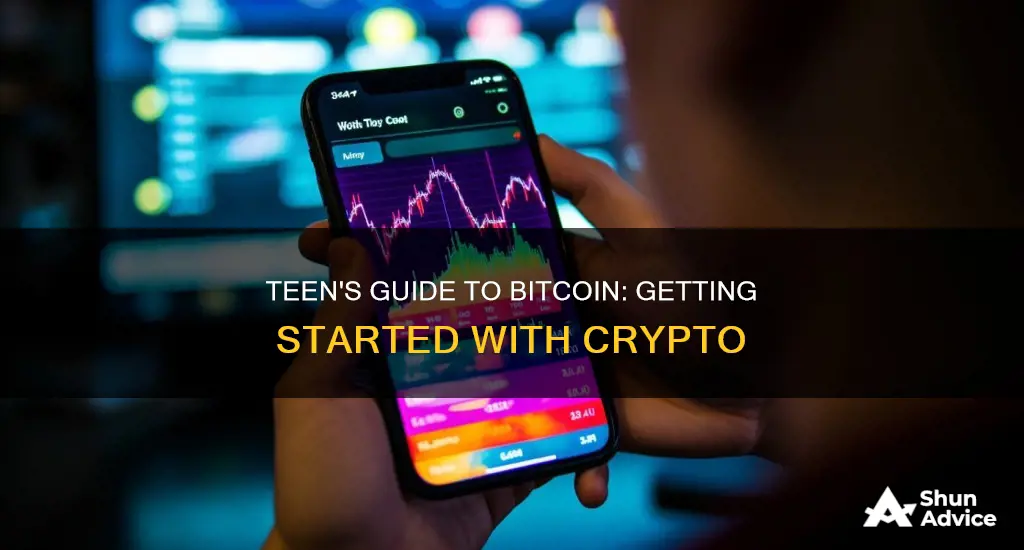
Bitcoin and other cryptocurrencies are becoming increasingly popular, especially among teenagers who view them as the wave of the future and a more suitable medium of exchange than physical cash. While there are no laws prohibiting minors from investing in cryptocurrencies, many U.S.-based crypto exchanges require users to be at least 18 years old. This means that teenagers who want to invest in Bitcoin will likely need the help of their parents or guardians to get started.
| Characteristics | Values |
|---|---|
| Legality of minors investing in Bitcoin | There are no laws forbidding minors from investing in Bitcoin |
| Age restrictions on crypto exchanges | Most crypto exchanges require users to be 18 or older |
| Safest way to buy crypto for minors | With the participation of an adult |
| Crypto wallet for minors | Decentralized crypto wallet |
| Ways for teens to buy crypto | Bitcoin ATMs, peer-to-peer exchanges, decentralized exchanges, getting paid in crypto for work or freelancing, gift cards |
What You'll Learn

Understanding the basics of Bitcoin
Bitcoin is a decentralised, digital currency that was introduced in 2008 by an anonymous creator known as Satoshi Nakamoto. It is the world's first decentralised cryptocurrency, using blockchain technology to secure and verify transactions.
Bitcoin is a peer-to-peer network, meaning that users can exchange value with one another directly, without the need for intermediaries like banks or governments. This makes it a borderless, 24/7 currency that anyone with an internet connection can use to send and receive payments.
Each Bitcoin is a digital asset that can be stored at a cryptocurrency exchange or in a digital wallet. Each individual coin represents the value of Bitcoin's current price, but you can also own partial shares of each coin. The smallest unit of Bitcoin is called a Satoshi, named after its creator. Each Satoshi is equivalent to 0.00000001 Bitcoins, so owning fractions of a Bitcoin is quite common.
Bitcoin transactions are authenticated through its proof-of-work consensus mechanism, which rewards cryptocurrency miners for validating transactions. This is done through a process called mining, which involves solving complex mathematical problems using powerful, specialised computer hardware.
Bitcoin is a highly volatile asset, and its value can change dramatically from day to day, or even minute to minute. This makes it a less-than-ideal payment option, as the price of goods or services could change significantly in a short space of time.
Despite its volatility, Bitcoin has seen massive growth since its inception, with the price of a single Bitcoin increasing from less than a cent to tens of thousands of dollars. It is also the most popular crypto option and is considered a store of value, similar to gold.
To get started with Bitcoin, you'll need to install a Bitcoin wallet on your computer or mobile phone, which will generate your first Bitcoin address. You can then disclose this address to friends or family so that they can send you Bitcoin, or vice versa. It's important to note that Bitcoin addresses should only be used once.
If you're considering investing in Bitcoin, it's crucial to understand the risks involved. While it offers the potential for high returns, it is a highly speculative and unregulated investment. There is also a risk of hacks or fraud, as well as regulatory uncertainty, which could significantly impact the value of your investment.
A Beginner's Guide to Investing in Bitcoin in India
You may want to see also

How to get started with a custodial account
A custodial account is an adult-managed investment account that allows a parent or guardian to open an account on behalf of their child. The assets in the account are legally owned by the child, but the adult makes the investment decisions. Custodial accounts are a great way for teens to invest in Bitcoin or other cryptocurrencies.
- Choose a custodial account platform: There are several platforms that offer custodial accounts for crypto, such as EarlyBird, Coinx Teen, and UNest. Compare the features, fees, and investment options of each platform before deciding.
- Open an account: Once you've chosen a platform, the parent or guardian will need to provide their basic information to open the account. They may also need to provide the child's information, such as their name, date of birth, and Social Security number.
- Fund the account: The next step is to fund the account with fiat currencies, such as US dollars or euros. The parent or guardian can transfer money into the account, and other family members or friends can also contribute as gifts to the minor.
- Choose investment options: Decide which cryptocurrencies you want to invest in, such as Bitcoin or Ethereum. You can also choose to invest in crypto exchange-traded funds (ETFs) or mutual funds, which offer exposure to crypto assets without directly owning them.
- Make purchases: Once the account is funded, you can start purchasing cryptocurrencies or crypto-related investments. Remember to consider the risks and volatility of the crypto market and only invest what you are willing to lose.
- Monitor and manage the account: The parent or guardian can monitor the account activity and balances. They can also manage the investments and make changes as needed.
- Transfer to the child: When the child reaches the age of majority (usually 18), the account will be transferred to their name, and they will gain full access and control over the assets.
It's important to note that while custodial accounts offer a way for teens to invest in cryptocurrencies, it's crucial to understand the risks involved. Cryptocurrencies are highly volatile and unregulated, so it's important to do your research and invest wisely. Additionally, not all crypto platforms offer custodial accounts, so be sure to choose a platform that specifically caters to underage investors.
The Ultimate Guide to Profiting with Bitcoin Investments
You may want to see also

The risks and benefits of investing in Bitcoin
Bitcoin is a highly volatile investment, and investors need to be aware of the risks involved before deciding to invest. While it has the potential for high returns, it is important to remember that it is a risky asset that may not be suitable for everyone. Here are some of the key risks and benefits of investing in Bitcoin:
Risks of Investing in Bitcoin:
- Volatile and fluctuating market: The price of Bitcoin is constantly changing and unpredictable, making it difficult to determine if you will get a return on your investment.
- Cyber threats and hacking: Bitcoin is technology-based and stored in digital wallets, making it vulnerable to cyberattacks, hacking, and theft.
- Fraud and scams: The lack of regulation in the Bitcoin market leaves investors susceptible to fraudulent exchanges and scams.
- Little or no regulation: The absence of major regulations and a clear government stance on cryptocurrency can create uncertainty and impact the stability of the market.
- Technology reliance: As an online exchange, Bitcoin is entirely reliant on technology. Without it, Bitcoin has no value, and investors are more vulnerable to cyber threats and online fraud.
- High transaction costs: Bitcoin transactions can be expensive, with high fees and taxes.
- Lack of insurance: Bitcoin is not insured by the Federal Deposit Insurance Corporation (FDIC) or the Securities Investor Protection Corporation (SIPC), leaving investors unprotected against losses.
- Market risk: Bitcoin values can be highly sensitive to newsworthy events, and its price has seen wild fluctuations over its short existence.
- Access and security issues: The complex nature of storing and accessing Bitcoin, such as remembering or securing lengthy password phrases, can create challenges and increase the risk of losing access to your investment.
- Uncertain future: It is unclear whether Bitcoin and cryptocurrency are here to stay in their current form. The possibility of central banks establishing their own digital currencies could significantly impact the cryptocurrency market.
Benefits of Investing in Bitcoin:
- Decentralization and unrestricted access: Bitcoin is designed to be decentralized, allowing users unrestricted access to their coins without the control of a single government or central bank.
- Easy accessibility: Bitcoin is easily accessible to everyone with an internet connection and a crypto wallet, including those without access to traditional banking.
- Lower fees and faster transactions: Bitcoin transactions can have lower fees and faster transfer times compared to traditional bank transactions, especially for global wires.
- High return potential: Despite its volatility, Bitcoin has yielded high returns in the past, depending on when it was purchased.
- Blockchain technology: Bitcoin operates on blockchain technology, which is fully public, transparent, and immutable, meaning every transaction can be tracked, and the data cannot be changed or manipulated.
- Growing popularity and acceptance: As Bitcoin grows in popularity, more mainstream financial institutions and businesses are showing interest, and some companies are starting to accept it as a form of payment.
- Non-correlation with traditional assets: Bitcoin has the potential to be a non-correlated asset, similar to gold, meaning it may not follow the trends of traditional assets like stocks.
Bitcoin Gift Cards: Easy Investing for Beginners
You may want to see also

How to buy and sell Bitcoin
If you're a teenager, there are several ways to buy and sell Bitcoin. Here are some of the most common methods:
- Ask your parents or guardians: This is often the easiest and safest way to get started with Bitcoin. You can explain your interest in crypto, the potential risks and benefits, and even suggest reputable sources of information to educate them about it. If they agree, you can register on a crypto exchange under their name and with their consent. Some popular exchanges that allow this include Coinbase, Binance, and Kraken. Once you've purchased the Bitcoin, you can transfer it to your crypto wallet.
- Use a Peer-to-Peer (P2P) Platform: P2P platforms are websites or apps that directly connect buyers and sellers of crypto, without intermediaries. You can find sellers who accept your preferred payment methods, such as cash, PayPal, or gift cards, and negotiate the terms of the trade. To ensure the safety of the transaction, use an escrow service, which holds the funds until the trade is completed. Popular P2P platforms that don't require ID verification include LocalCryptos, Paxful, and LocalBitcoins. However, be cautious of scammers and always check the seller's reputation and reviews.
- Bitcoin ATMs: Bitcoin ATMs are machines that allow you to buy or sell Bitcoin with cash. You can locate one near you using websites or apps like Coin ATM Radar or Bitcoin ATM Map. Insert cash into the machine, scan your crypto wallet address, and receive Bitcoin in your wallet. Some ATMs may also support other cryptocurrencies like Ethereum or Litecoin. This method is fast and anonymous, but it may come with high fees, low transaction limits, and limited availability.
- Decentralized Exchanges (DEXs): DEXs are online marketplaces where you can buy and sell cryptocurrencies without a central authority like a bank. They use smart contracts, which are computer programs that automatically handle transactions. Popular DEXs include Uniswap, PancakeSwap, and SushiSwap. To use a DEX, you'll need a crypto wallet, and you can purchase crypto using various payment methods like bank transfers, credit cards, or debit cards.
- Freelancing for Crypto Payments: If you have skills in software development, web design, content writing, or other areas, you can find freelance work that pays in Bitcoin. There are crypto-focused freelance websites like CryptoJobs, Pompcryptojobs, and BitGigs, where you can offer your services or apply for jobs. This way, you can earn Bitcoin without worrying about age restrictions.
- Gift Cards: You can buy gift cards from various stores or online platforms and then exchange them for Bitcoin on P2P websites like Paxful and BitValve. This method allows you to acquire crypto without providing any personal information or verifying your age.
- Register on an Exchange Under a Parent or Sibling's Name: If you're under 18, you can ask your parents or older siblings to help you set up an account on a crypto exchange. With their consent, you can use their ID and payment methods to register and trade. Popular exchanges like Binance, Coinbase, and Kraken can be used for this purpose.
It's important to remember that investing in Bitcoin and other cryptocurrencies carries risks, and the value of your investment can fluctuate significantly. Always do your own research and invest only what you can afford to lose. Additionally, be cautious of scams and choose secure methods and platforms for your transactions.
Edward Jones: Bitcoin Investment Options and Opportunities
You may want to see also

The future of Bitcoin and other cryptocurrencies
Bitcoin and other cryptocurrencies have exploded in popularity since the former's inception in 2009. As of mid-2023, an estimated 17% of US adults had invested in, traded, or used cryptocurrency. This surge in popularity has created new challenges for governments and central banks.
The future of cryptocurrencies is highly debated. Some economic analysts predict a big change in crypto as institutional money enters the market, and there is a possibility that crypto will be floated on the Nasdaq. However, there is also a chance that cryptocurrencies will be banned by governments. Cryptocurrencies are already illegal in China, and at least eight other countries have banned them.
Cryptocurrencies are considered a democratizing force by proponents, who argue that they wrest the power of money creation and control from central banks and Wall Street. On the other hand, critics argue that cryptocurrencies empower criminal groups, terrorist organizations, and rogue states, and stoke inequality.
The future of cryptocurrencies likely lies in how well they can navigate the regulatory landscape and address concerns over criminal activity, environmental harm, and consumer protection. If cryptocurrencies become a dominant form of global payments, they could limit the ability of central banks to set monetary policy.
The success or failure of Bitcoin in dealing with these challenges may determine the fortunes of other cryptocurrencies in the years ahead.
Trinidad and Tobago's Bitcoin Investment Strategy
You may want to see also
Frequently asked questions
A teenager can buy Bitcoin with the help of their parents, who can open a custodial account on their behalf. Alternatively, they can use a decentralised exchange or a Bitcoin ATM, but these methods are riskier.
Crypto investing is high-risk and mostly unregulated, so teens should not invest more than they can afford to lose. However, the blockchain is incredibly hard to hack, making it one of the safest investment options.
The best way for a teenager to invest in Bitcoin is with the help of their parents, who can open a custodial account and manage the purchasing of the assets.







